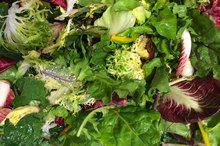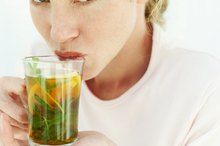What does fact checked mean?
At Healthfully, we strive to deliver objective content that is accurate and up-to-date. Our team periodically reviews articles in order to ensure content quality. The sources cited below consist of evidence from peer-reviewed journals, prominent medical organizations, academic associations, and government data.
The information contained on this site is for informational purposes only, and should not be used as a substitute for the advice of a professional health care provider. Please check with the appropriate physician regarding health questions and concerns. Although we strive to deliver accurate and up-to-date information, no guarantee to that effect is made.
Does Excessive Caffeine Cause Potassium Depletion?
Having depleted levels of potassium in your body is known as hypokalemia 3. It has a variety of causes, one of which is increased urination, and this can be the result of consuming an excessive amount of caffeine. Because caffeine acts as a diuretic, drinking too much may cause you to lose potassium. Talk to your doctor about your potassium levels and ways to reduce your caffeine intake, if necessary.
Definition of Excessive Caffeine
According to the University of Maryland Medical Center, excessive caffeine consumption is defined as ten 8 oz 1. cups of coffee a day, or the caffeine equivalent in tea or soda. Moderate intake is three 8 oz. cups of coffee a day, which gives you roughly 250 mg of caffeine. You may also experience excessive urination, which can lead to a potassium deficiency.
- According to the University of Maryland Medical Center, excessive caffeine consumption is defined as ten 8 oz 1.
Symptoms and Other Causes of Hypokalemia
Can Too Much Caffeine Cause Anger & Confusion?
Learn More
This condition is very rarely the result of a lack of potassium in your diet 2. Rather, it is most often caused by excessive urination from taking diuretics or drinking too much caffeine, which acts as a diuretic. It can also occur if you have diarrhea or any illness that causes you to have loose stools, which will also deplete your potassium levels. Additionally, certain antibiotics, diseases and eating disorders can lead to hypokalemia as well 3. If you suspect you have this condition, seek medical attention.
Prevention
To prevent losing too much potassium through your urine, cut down on the amount of caffeine you consume. Reduce your intake gradually to avoid experiencing withdrawal symptoms, such as vomiting and irritability. This typically means decreasing your serving of coffee or tea by 1/2 c every few days or substituting with a decaffeinated version. Also be sure to include plenty of potassium-rich foods in your diet, such as:
- peas
- lima beans
- flounder
- cod
- kiwi
- dried apricots
- milk
- yogurt 2
Healthy adults need 4.7 g of potassium a day, according to MedlinePlus, but you may need more if you consume caffeine or are at risk for hypokalemia 23. Your doctor can help you determine the proper amount of potassium for you.
- To prevent losing too much potassium through your urine, cut down on the amount of caffeine you consume.
- Also be sure to include plenty of potassium-rich foods in your diet, such as: * peas
* lima beans
* flounder
* cod
* kiwi
* dried apricots
* milk
* yogurt 2 Healthy adults need 4.7 g of potassium a day, according to MedlinePlus, but you may need more if you consume caffeine or are at risk for hypokalemia 2.
Additional Considerations
Furosemide & Potassium
Learn More
Do not alter your diet or caffeine intake without first consulting with a doctor. If you begin consuming less caffeine and experience withdrawal symptoms that worsen or do not subside, seek the attention of a medical professional. Also, if you suspect you have hypokalemia, do not attempt to remedy it on your own 3. This condition can be dangerous and must be treated by a licensed physician.
- Do not alter your diet or caffeine intake without first consulting with a doctor.
- If you begin consuming less caffeine and experience withdrawal symptoms that worsen or do not subside, seek the attention of a medical professional.
Related Articles
References
- University of Maryland Medical Center: Potassium
- MedlinePlus: Potassium in Diet
- MedlinePlus: Hypokalemia
- Potassium. Office of Dietary Supplements. National Institutes of Health
- Lambert H, Frassetto L, Moore JB, et al. The effect of supplementation with alkaline potassium salts on bone metabolism: a meta-analysis. Osteoporos Int. 2015;26(4):1311-8. doi:+10.1007/s00198-014-3006-9
- Chatterjee R, Slentz C, Davenport CA, et al. Effects of potassium supplements on glucose metabolism in African Americans with prediabetes: a pilot trial. Am J Clin Nutr. 2017;106(6):1431-1438. doi:10.3945/ajcn.117.161570
- Potassium. Fact Sheet for Consumers. Office of Dietary Supplements. National Institutes of Health
- Health Claim Notification for Potassium Containing Foods. US Food and Drug Administration
- Aburto NJ, Hanson S, Gutierrez H, Hooper L, Elliott P, Cappuccio FP. Effect of increased potassium intake on cardiovascular risk factors and disease: systematic review and meta-analyses. BMJ 2013;346:f1378.
- Academy of Nutrition and Dietetics. What Is Potassium?
- ConsumerLab.com. Potassium Supplements Review.
- Curhan GC, Willett WC, Rimm EB, Stampfer MJ. A prospective study of dietary calcium and other nutrients and the risk of symptomatic kidney stones. N Engl J Med 1993;328:833-8.
- Curhan GC, Willett WC, Speizer FE, Spiegelman D, Stampfer MJ. Comparison of dietary calcium with supplemental calcium and other nutrients as factors affecting the risk for kidney stones in women. Ann Intern Med 1997;126:497-504.
- D’Elia L, Barba G, Cappuccio FP, Strazzullo P. Potassium intake, stroke, and cardiovascular disease a meta-analysis of prospective studies. J Am Coll Cardiol 2011;57:1210-9.
- O’Neil C, Keast D, Fulgoni V, and Nicklas T. Food sources of energy and nutrients among adults in the US: NHANES 2003-2006. Nutrients. 2012;4:2097-120. DOI: 10.3390/nu4122097.
- Stone M, Martyn L, and Weaver C. Potassium intake, bioavailability, hypertension, and glucose control. Nutrients. 2016;8: E444. DOI: 10.3390/nu8070444.
- U.S. Food and Drug Administration. Health Claim Notification for Potassium Containing Foods.
- Weaver CM. Potassium and health. Adv Nutr 2013;4:368S-77S.
- Yong Sun, et al. Dietary potassium regulates vascular calcification and arterial stiffness. JCI Insight. 2017;2(19):e94920.
Writer Bio
Lynne Sheldon has over 12 years of dance experience, both in studios and performance groups. She is an avid runner and has studied several types of yoga. Sheldon now works as a freelance writer, editor and book reviewer. She holds a Bachelor of Arts in English and art history from Boston University and recently completed her Master of Fine Arts in writing from Pacific University.









